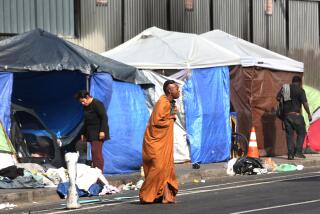Villaraigosa announces impending shutdown of Occupy L.A. camp
- Share via
The City Hall park where Occupy Los Angeles protesters are camped will be closed at 12:01 a.m. Monday, according to Los Angeles Mayor Antonio Villaraigosa, triggering what officials hope will be an end to the nation’s largest remaining Occupy camp.
But police might not immediately begin removing protesters who linger, the mayor said at a news conference Friday with Police Chief Charlie Beck. He said officials hope in the coming days to help protesters move their belongings and to find beds in homeless shelters for those at the camp who need them.
The two officials would not say whether police were prepared to use tear gas or rubber bullets to clear protesters who refuse to leave, tactics officers in other cities have turned to while clearing Occupy encampments. “The goal is to do this as peacefully as possible,” Beck said.
When Occupy protesters set up camp on the City Hall lawn seven weeks ago, officials went out of their way to welcome them. The City Council passed a resolution in support of the demonstration, and council President Eric Garcetti invited protesters to “stay as long as you need to.” On a wet morning in October, aides to Villaraigosa handed out rain slickers.
But the political tide inside City Hall has turned against those camped outside — a shift driven by concerns about damage to the lawn and public health and safety risks.
Speaking before cameras on Friday, Villaraigosa read from a letter addressed to Occupy Los Angeles. The mayor, himself a former labor union and community organizer, praised the protesters for shifting the national dialogue to issues of social justice and economic equality.
“In seven short weeks, you have awakened the country’s conscience,” he said. “You have given voice to those who have not been heard.”
But he said the movement was now at a crossroads, with a choice of “spreading the message of economic equality” or defending “a particular patch of earth.”
The mayor said officials here had done things differently by negotiating with protesters. “From the start, we’ve talked with one another and we’ve listened to each other,” he said, before being interrupted by a protester who had found his way into the news conference and shouted: “You haven’t listened!”
City officials have held regular meetings with several Occupy protesters, including a representative from the National Lawyers Guild. But other protesters have complained that those representatives don’t speak for everyone and have dismissed the meetings as going against the demonstration’s democratic principles and its “horizontal” organizing structure.
On Thursday, Occupy L.A. released its first official statement to the city, vowing to stay camped out on the lawn.
According to protester Ruth Fowler, the statement was written collaboratively by several hundred protesters and was approved with 100% consensus during Wednesday’s general assembly meeting. In it, protesters said they would cease further negotiations with officials until 10 grievances were addressed.
Some demands on the list are specific, like a call for a moratorium on all home foreclosures in Los Angeles, as well as a call for the city to divest from all major banks. Others, such as a call for “money to be removed from politics,” are less so.
The protesters also want a new name for the 1.7 acres of lawn surrounding City Hall: “Solidarity Park.”
Once the city evicts the protesters, a barrier will be constructed to keep people off the lawn so crews can work to rehabilitate it. The city plans to keep access to the west steps of City Hall open so the Occupy group — and anyone else — has a place to gather.
Villaraigosa did not say why he decided to close the park now. Although the mayor plans to go out of town next Saturday on a trade mission to Asia, Deputy Chief of Staff Matt Szabo said the trip was not a factor.
In 2007, Villaraigosa was forced to cut short a trip to El Salvador after police beat demonstrators during a May Day immigrant-rights rally in MacArthur Park.
Some Occupy protesters say they won’t willingly leave the City Hall park and have called on supporters to join them. It remains to be seen whether labor unions will play a role if and when police move in to evict protesters.
Maria Elena Durazo, head of the powerful Los Angeles County Federation of Labor, has endorsed the Occupy movement. But after an Occupy protest at Bank of America Plaza on downtown’s Bunker Hill earlier this month, she indicated that banks might be more “fitting” targets than City Hall.
On Friday, Good Jobs LA, a coalition of labor unions and community groups that has organized marches with Occupy L.A., called on the mayor and City Council to allow the camp to remain where it is.
“Elected leaders should be more concerned about enforcing regulations on banks than enforcing park rules,” spokesman Jacob Hay said. “They should be busy creating jobs, not creating conflict with peaceful protesters.”
Councilman Bill Rosendahl, who co-wrote the non-binding council resolution, declined to say whether he supports the mayor’s decision, saying he didn’t know enough about the rationale for the timing. But he asked that police officers work with protesters on a “peaceful transition.”
“I’m hopeful that there will be no violence,” he said.
Times staff writer David Zahniser contributed to this report.
twitter.com/katelinthicum
More to Read
Sign up for Essential California
The most important California stories and recommendations in your inbox every morning.
You may occasionally receive promotional content from the Los Angeles Times.











